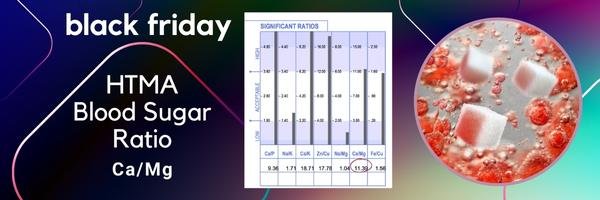Blood Sugar Ratio Ca/MG
Hair Tissue Mineral Analysis, is a functional lab test measuring the overall mineral and metal content that has been excreted into the hair over the past 3 or 4 months. It is a remarkably accurate measurement tool to learn about nutritional and mineral deficiencies in the body. It also provides different mineral ratios that are also very important considerations for proper mineral balancing.
The understanding of mineral ratios is more revealing than analyzing mineral levels alone. Ratios are reflective of disease trends, predictive of hidden or future metabolic dysfunctions. though are not diagnostic. To calculate a ratio value, the first mineral level is divided by the second mineral level. In this case Calcium is divided by the Magnesium level for the Blood Sugar ratio.
The optimal Blood Sugar ratio is 7.00 with an Ideal range of 4.50–8.50. If the ratio is greater than (>)8.50 this is indicative of Hypoglycemia and associated with an increase in insulin. If it is less than <4.50, this indicative of Hyperglycemia and reflects the potential for low insulin levels and elevated adrenal cortical hormone production. In the above graph, this person's ratio is 11.39, yet this person has not been alerted to any issues with Blood Sugar concerns with normal blood lab work.
Having an HTMA can be an early indication of some blood sugar dysregulation when normal blood serum testing has not yet identified such an issue. The higher number will point to imbalanced glucose metabolism and magnesium deficiency which was also evident on this person's nutritional profile. If the person is chronically stressed, this will also allow Calcium to increase. If there is hidden Copper toxicity, this will also affect Calcium. Hidden Copper toxcity can also be detected with HTMA, but I will share that information another time.
Some of the symptoms associated with a high blood sugar ratio are muscle spasms, twitches, constipation and sugar cravings. This person also identified with some of these symptoms. So having a higher Blood Sugar ratio indicates a need to supplement with Magnesium, to reduce stress and/or to find outlets to help relieve the stress. However, if the ratio was low, then it would indicate that this person might be better supported with Calcium and it's helper Vitamin K2. Calcium aids in insulin release while Magnesium inhibits insulin release.
Other Nutrients Levels Identified on an HTMA that impact Insulin Production or lack of.
Chromium: It is well known that people with Diabetes tend to be low in Chromium. It is a component of the glucose tolerance factor (GTF) and chromium is involved as a cellular receptor for insulin. Therefore a deficiency of chromium can result in elevated glucose, triglycerides, and cholesterol levels.
Zinc: Zinc serum levels are low in many people with Diabetes. Zinc affects the antigenic properties of insulin and the binding of insulin to hepatocyte membranes. A Zinc deficiency can result in increased insulin resistance and hyperglycemia. Low levels of zinc is a factor in poor wound-healing. Zinc is required for insulin storage and also cellular binding. However, high concentrations can lead to a reduction in insulin release.
Manganese: A deficiency can impair glucose utilization. Intra-uterine deficiency produces islet cell atrophy. Hepatic manganese is elevated in some forms of diabetes.
Iron: Excess iron accumulates in the pancreas and can result in tissue injury. Plus iron excess relative to copper results in increased lipid peroxidation, which is chain of reactions of oxidative degradation of lipids. Free radicals "steal" electrons from the lipids in cell membranes which result in cell damage.
Selenium: Insulin reserves are diminished with deficiency of selenium and can contribute to glucose intolerance. Selenium deficiency results in decreased glutathione peroxidase activity.
Copper: A Copper deficiency results in glucose intolerance decreased insulin response and increased glucose response. Copper is synergistic to calcium, which is why high tissue calcium is usually found with elevated tissue copper. Copper Toxicity is a build up of stored, bio-unavailable copper in excessive levels which can cause physical and mental dysfunction.
VItamin Deficiencies:
Besides the importance of balancing these minerals, it is also important to consider vitamins as they are co-factors to minerals and some deficiencies have also been correlated to Diabetic symptoms. Vitamin B1 deficiency may be related to the development of diabetic neuropathy. Low concentrations of Vitamin A aids in the stimulation of insulin release from the pancreas. also it can inhibit insulin release at high concentrations. People with Diabetes require higher Vitamin E and helps reduce oxidative stress and improve the action of insulin.
The Blood Sugar Ratio and other mineral levels on an Hair Tissue Mineral Analysis gives us a tremendous amount of information for mineral balancing, accompanying vitamin supplementation to more optimal nutritional interventions for the prevention of further or future blood sugar dysregulation. It can help with recommendations for dietary and lifestyle changes as well.
And to think this is just one ratio to consider! An HTMA is a wealth of preventative information in so many other areas.
Getting an HTMA, can absolutely points the way to interventions to change the course of your health and bring these ratios into more ideal readings. When you do, your symptoms will decrease and you will notice the difference!
Remember to pre-book and pre-pay for your HTMA by Nov 25th, 2022 to receive a Black Friday Special, for dates now until Dec 9th, 2022. Book your HTMA on my website. The link is below and there are more details and several research conclusions about HTMA. Gift one to a family member or friend. There is no greater gift, than a gift of health!
Let a Hair Tissue Mineral Analysis benefit your health and wellness journey!



